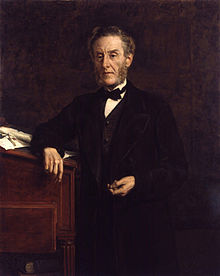Anthony Ashley-Cooper, 7th Earl of Shaftesbury
| The Earl of Shaftesbury | |
|---|---|

Anthony Ashley-Cooper, 7th Earl of Shaftesbury by John Collier
|
|
| Born |
28 April 1801 24 Grosvenor Square, London |
| Died | 1 October 1885 (aged 84) 12 Clifton Gardens, Folkestone, Kent |
| Cause of death | Inflammation of the lungs |
| Resting place | The parish church on his estate at Wimborne St Giles, Dorset |
| Known for | Philanthropy |
| Years active | 44 Years |
| Nationality | British |
| Successor | Anthony Ashley-Cooper, 8th Earl of Shaftesbury |
Anthony Ashley Cooper, 7th Earl of Shaftesbury KG Bt (28 April 1801 – 1 October 1885), styled Lord Ashley from 1811 to 1851 and then Lord Shaftesbury following the death of his father, was an English politician, philanthropist and social reformer. He was a son of Cropley Ashley-Cooper, 6th Earl of Shaftesbury and older brother of Anthony Henry Ashley-Cooper.
1801–1885 Lord Ashley, as he was styled until his father's death in 1851, was educated at Manor House school in Chiswick (1812–1813), Harrow School (1813–1816) and Christ Church, Oxford, where he gained first class honours in classics in 1822, took his MA in 1832 and was appointed DCL in 1841.
Ashley's early family life was loveless, a circumstance common among the British upper classes, and resembled in that respect the fictional childhood of Esther Summerson vividly narrated in the early chapters of Charles Dickens's novel Bleak House. G.F.A Best in his biography Shaftesbury writes that: "Ashley grew up without any experience of parental love. He saw little of his parents, and when duty or necessity compelled them to take notice of him they were formal and frightening."
This difficult childhood was softened by the affection he received from his housekeeper Maria Millis, and his sisters. Millis provided for Ashley a model of Christian love that would form the basis for much of his later social activism and philanthropic work, as Best explains: "What did touch him was the reality, and the homely practicality, of the love which her Christianity made her feel towards the unhappy child. She told him bible stories, she taught him a prayer." Despite this powerful reprieve, school became another source of misery for the young Ashley, whose education at Manor House from 1808 to 1813 introduced a "more disgusting range of horrors". Shaftesbury himself shuddered to recall those years, "The place was bad, wicked, filthy; and the treatment was starvation and cruelty."
Ashley was elected as the Tory Member of Parliament for (a pocket borough controlled by the Duke of Marlborough) in June 1826 and was a strong supporter of the Duke of Wellington. After George Canning replaced Lord Liverpool as Prime Minister, he offered Ashley a place in the new government, despite Ashley having been in the Commons for only five months. Ashley politely declined, writing in his diary that he believed that serving under Canning would be a betrayal of his allegiance to the Duke of Wellington and that he was not qualified for office. Before he had completed one year in the Commons, he had been appointed to three parliamentary committees and he received his fourth such appointment in June 1827, when he was appointed to the Select Committee On Pauper Lunatics in the County of Middlesex and on Lunatic Asylums.
...
Wikipedia
